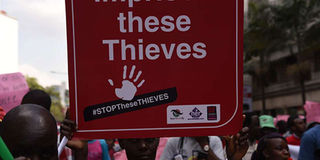Make it difficult for the corrupt to thrive in Kenya

Kenyans take part in an anti-corruption protest in Nairobi on May 31, 2018. Corruption is linked to most of the social ills in society today. PHOTO | FILE | NATION MEDIA GROUP
What you need to know:
- We have allowed a morally bankrupt culture to encroach on our public space where citizens are normalised to accept errant behaviour.
- Collectively as Kenyans, we must loathe corruption and the corrupt so much that we make it impossible for corrupt people to use their loot to ascend to office.
During the trial of Jesus Christ just before his crucifixion, Pontius Pilate gave the people a choice between Jesus the Messiah and Barabbas, a notorious thief and murderer.
“Which of the two do you want me to release to you”, he asked. “Barabbas”, the crowd shouted in unison. Pilate then asked, “What shall I do with Jesus, the Messiah?” The crowd shouted, “Crucify him!”.
This biblical incident is a mirror reflection of what is happening in our country today. How else do you explain the fact that leaders accused of corruption and serious economic crimes find it easier to get elected to public office than people of impeccable record?
Corruption seems like a sure way to get leaders elected to office. They use that as redemption and insulation against possible prosecution.
We have allowed a morally bankrupt culture to encroach on our public space where citizens are normalised to accept errant behaviour. Now we hear people saying things like, “Yes, he is a thief; but he is our thief”.
POOR GROWTH
Corrupt leaders have been emboldened to openly defend their corrupt acts.
We have seen well-coordinated onslaughts against the offices and agencies charged with fighting corruption. These campaigns are organised by powerful, moneyed and well-connected individuals keen on defeating the anti-corruption efforts. And yet the public does not appear bothered enough.
Corruption is linked to most of the social ills in society today. Generally, it’s the citizens who bear the brunt of corruption in their daily lives when they are unable access government services because of the demands for bribes; when they die or get maimed on poor roads because contractors bribed their way through; when they can’t access affordable food and decent healthcare because allocations were siphoned off; and when their children can’t access quality education because there are no facilities and books.
The greatest undoing for us is that the corrupt do not associate their actions with any consequences as the public continues to tolerate corrupt leaders who use ethnic politics and smart lawyers to escape accountability.
MAIMED EFFORTS
It is clear President Uhuru Kenyatta has acknowledged corruption as a major threat not only to his legacy but to the future of this country.
He has adopted measures to fight corruption by reconstituting the critical offices of the Attorney General, Inspector General of Police, Director of Public Prosecutions, Directorate of Criminal Investigations and Ethics and Anti-Corruption Commission, ordering lifestyle audits, vetting of procurement officers, publication of all government tenders and contracts, and most recently, demonetisation.
However, even with all these efforts, there is one missing element that goes beyond the President and the anti-corruption agencies.
Collectively as Kenyans, we must loathe corruption and the corrupt so much that we make it impossible for corrupt people to use their loot to ascend to office.
We must not entertain people who steal from us and then use the ill-gotten wealth to lure us into voting for them.
DENOUNCE
We must reject attempts by corrupt leaders to frame the fight against corruption as an attack against entire communities.
We must reject leaders who want to ascend to office on the platform of defending corruption and the corrupt and undermining agencies formed to deal with corruption.
While we disagree on many things as Kenyans, we must build a public consensus that corruption, left untamed, will destroy this country.
We must change our attitudes and behaviour towards corruption and the corrupt by denying them the opportunity and platform to normalise corruption.
JUSTICE
The courts must not allow the corrupt to use their money and influence to frustrate justice.
They must not give the impression that the powerful and the rich can escape justice by buying their way out.
Religious leaders, community leaders and civil society leaders must speak out and mobilise against corruption, and teachers must instil values in our children.
The corrupt must be treated like lepers in the Bible, shunned by everyone. Everyone must take a side. A large, united public outcry is needed to provide the force of systemic change that public institutions alone can’t produce.
Dr Kamau is a media and communications lecturer at Aga Khan University’s Graduate School of Media and Communications; [email protected]




